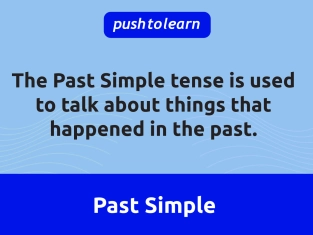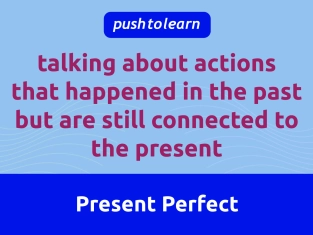by PushtoLearn
Past Simple vs Present Perfect
Table of Contents
- Past Simple vs Present Perfect - Exercises
- Key Differences Between Past Simple and Present Perfect
- How to Form Past Simple vs. Present Perfect
- Time Expressions: Past Simple vs. Present Perfect
- Past Simple vs. Present Perfect in Different Situations
- Common Mistakes
- Everyday Conversations: Past Simple vs. Present Perfect
- FAQs about Past Simple vs. Present Perfect
Past Simple vs Present Perfect - Exercises
These exercises focus on Past Simple vs Present Perfect
-
Past Simple talks about finished actions at a specific time in the past.
-
Present Perfect talks about past actions with a connection to the present.
Key Differences Between Past Simple and Present Perfect
|
Feature |
Past Simple |
Present Perfect |
|
When do we use it? |
For actions completed in the past |
For actions with a connection to now |
|
Time reference |
We say when it happened (yesterday, last week, in 2010, etc.) |
No specific time (ever, never, just, already, yet, since, for) |
|
Example sentence |
I saw that movie last night. |
I have seen that movie. |
|
Finished or unfinished time? |
Finished time (Last year, last week, yesterday, in 2005) |
Unfinished time (This week, this year, in my life) |

How to Form Past Simple vs. Present Perfect
Past Simple
[Subject] + [verb in past]
|
Subject |
Verb (Past Simple) |
|
I |
ate |
|
You |
saw |
|
He/She/It |
went |
|
We |
visited |
|
They |
worked |
Example Sentences:
-
I watched a movie last night.
-
She went to Paris in 2021.
-
They studied English when they were younger.
See also Irregular Verbs
Present Perfect
[Subject] + [have/has] + [past participle]
|
Subject |
Have/Has |
Past Participle |
|
I |
have |
seen |
|
You |
have |
eaten |
|
He/She/It |
has |
gone |
|
We |
have |
done |
|
They |
have |
written |
Example Sentences:
-
I have watched that movie before.
-
She has been to Paris three times.
-
They have studied English for many years.
See also Past Participle
Time Expressions: Past Simple vs. Present Perfect
|
Use with Past Simple |
Use with Present Perfect |
|
Yesterday |
Ever / Never |
|
Last night |
Just / Already |
|
Last week |
Yet |
|
In 2010 |
Since / For |
|
When I was a child |
So far / Recently |
|
Two days ago |
This week / This month |
See also Prepositions of Time
Past Simple vs. Present Perfect in Different Situations
1. When Talking About Finished vs. Unfinished Time
❌ Incorrect: I have seen that movie yesterday.
✅ Correct: I saw that movie yesterday. (Past Simple → "yesterday" is a finished time)
✅ Correct: I have seen that movie before. (Present Perfect → No time is mentioned)
2. When Talking About Life Experiences
✅ Correct: I have traveled to Japan. (Present Perfect → Experience in life)
✅ Correct: I traveled to Japan in 2018. (Past Simple → Specific year is mentioned)
3. When Talking About Recent Actions
✅ Correct: She has just finished her homework. (Present Perfect → Recently finished, no time mentioned)
✅ Correct: She finished her homework an hour ago. (Past Simple → Specific time: "an hour ago")
Common Mistakes
1. Using Present Perfect with a Specific Past Time
❌ I have visited London in 2015.
✅ I visited London in 2015.
2. Using Past Simple Without a Time Expression
❌ She went to the store. (This is correct only if the time is clear from context.)
✅ She has gone to the store. (If we don’t say when.)
3. Forgetting "have/has" in Present Perfect
❌ I been to Spain.
✅ I have been to Spain.
Everyday Conversations: Past Simple vs. Present Perfect
-
At a job interview:
-
Interviewer: Have you ever worked in customer service? (Present Perfect – Life experience)
-
You: Yes, I worked in a café last year. (Past Simple – Specific time)
-
Talking to a friend:
-
I have just finished my book. Have you read it? (Present Perfect – No time)
-
Yes! I read it last summer. (Past Simple – Specific time)
See also Narrative Tenses
FAQs about Past Simple vs. Present Perfect
When should I use Past Simple instead of Present Perfect?
Use Past Simple when you mention a specific time (I visited New York in 2019).
Can I use “ever” and “never” with Past Simple?
No! Ever and never are only used with Present Perfect (I have never been to China).
What is the difference between “I have gone” and “I went”?
-
I have gone to the store. (Present Perfect → I am still at the store.)
-
I went to the store. (Past Simple → I went and came back.)
Can I use Present Perfect with "yesterday"?
No. "Yesterday" is a finished time. Use Past Simple (I saw him yesterday).
How do I know if a sentence needs Present Perfect?
If the action has a connection to now, use Present Perfect (I have lost my keys → I still don’t have them).

